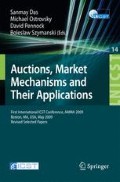Abstract
Game-theoretic analyses of distributed and peer-to-peer systems typically use the Nash equilibrium solution concept, but this explicitly excludes the possibility of strategic behavior involving more than one agent. We examine the effects of two types of strategic behavior involving more than one agent, sybils and collusion, in the context of scrip systems where agents provide each other with service in exchange for scrip. Sybils make an agent more likely to be chosen to provide service, which generally makes it harder for agents without sybils to earn money and decreases social welfare. Surprisingly, in certain circumstances it is possible for sybils to make all agents better off. While collusion is generally bad, in the context of scrip systems it actually tends to make all agents better off, not merely those who collude. These results also provide insight into the effects of allowing agents to advertise and loan money.
Access this chapter
Tax calculation will be finalised at checkout
Purchases are for personal use only
Preview
Unable to display preview. Download preview PDF.
References
Adar, E., Huberman, B.A.: Free riding on Gnutella. First Monday 5(10) (2000)
Aperjis, C., Johari, R.: A peer-to-peer system as an exchange economy. In: GameNets 2006: Proceeding from the 2006 Workshop on Game Theory for Communications and Networks, p. 10 (2006)
Brunelle, J., Hurst, P., Huth, J., Kang, L., Ng, C., Parkes, D., Seltzer, M., Shank, J., Youssef, S.: Egg: An extensible and economics-inspired open grid computing platform. In: Third Workshop on Grid Economics and Business Models (GECON), pp. 140–150 (2006)
Chun, B., Buonadonna, P., AuYung, A., Ng, C., Parkes, D., Schneidman, J., Snoeren, A., Vahdat, A.: Mirage: A microeconomic resource allocation system for sensornet testbeds. In: Second IEEE Workshop on Embedded Networked Sensors, pp. 19–28 (2005)
Cover, T., Thomas, J.: Elements of Information Theory. John Wiley & Sons, Inc., New York (1991)
Csiszár, I.: Sanov propery, generalized i-projection and a conditional limit theorem. The Annals of Probability 12(3), 768–793 (1984)
Douceur, J.R.: The sybil attack. In: Druschel, P., Kaashoek, M.F., Rowstron, A. (eds.) IPTPS 2002. LNCS, vol. 2429, pp. 251–260. Springer, Heidelberg (2002)
Friedman, E.J., Halpern, J.Y., Kash, I.A.: Efficiency and Nash equilibria in a scrip system for P2P networks. In: Proc. Seventh ACM Conference on Electronic Commerce (EC), pp. 140–149 (2006)
Friedman, E.J., Resnick, P.: The social cost of cheap pseudonyms. Journal of Economics and Management Strategy 10(2), 173–199 (2001)
Hens, T., Schenk-Hoppe, K.R., Vogt, B.: The great Capitol Hill baby sitting co-op: Anecdote or evidence for the optimum quantity of money? J. of Money, Credit and Banking 9(6), 1305–1333 (2007)
Hughes, D., Coulson, G., Walkerdine, J.: Free riding on Gnutella revisited: The bell tolls? IEEE Distributed Systems Online 6(6) (2005)
Jaynes, E.T.: Where do we stand on maximum entropy? In: Levine, R.D., Tribus, M. (eds.) The Maximum Entropy Formalism, pp. 15–118. MIT Press, Cambridge (1978)
Kash, I.A., Friedman, E.J., Halpern, J.Y.: Manipulating scrip systems: Sybils and collusion. arXiv:0903.2278v1
Kash, I.A., Friedman, E.J., Halpern, J.Y.: Optimizing scrip systems: Efficiency, crashes, hoarders and altruists. In: Proc. Eighth ACM Conference on Electronic Commerce (EC), pp. 305–315 (2007)
Mas-Colell, A., Whinston, M.D., Green, J.R.: Microeconomic Theory. Oxford University Press, Oxford (1995)
Ng, C., Buonadonna, P., Chun, B., Snoeren, A., Vahdat, A.: Addressing strategic behavior in a deployed microeconomic resource allocator. In: Third Workshop on Economics of Peer-to-Peer Systems (P2PECON), pp. 99–104 (2005)
Vishnumurthy, V., Chandrakumar, S., Sirer, E.G.: KARMA: a secure economic framework for peer-to-peer resource sharing. In: First Workshop on Economics of Peer-to-Peer Systems (P2PECON) (2003)
Walsh, K., Sirer, E.G.: Experience with an object reputation system for peer-to-peer filesharing. In: Third Symp. on Network Systems Design & Implementation (NSDI), pp. 1–14 (2006)
Yokoo, M., Sakurai, Y., Matsubara, S.: The effect of false-name bids in combinatorial auctions: new fraud in internet auctions. Games and Economic Behavior 46(1), 174–188 (2004)
Author information
Authors and Affiliations
Editor information
Editors and Affiliations
Rights and permissions
Copyright information
© 2009 ICST Institute for Computer Science, Social Informatics and Telecommunications Engineering
About this paper
Cite this paper
Kash, I.A., Friedman, E.J., Halpern, J.Y. (2009). Manipulating Scrip Systems: Sybils and Collusion. In: Das, S., Ostrovsky, M., Pennock, D., Szymanksi, B. (eds) Auctions, Market Mechanisms and Their Applications. AMMA 2009. Lecture Notes of the Institute for Computer Sciences, Social Informatics and Telecommunications Engineering, vol 14. Springer, Berlin, Heidelberg. https://doi.org/10.1007/978-3-642-03821-1_4
Download citation
DOI: https://doi.org/10.1007/978-3-642-03821-1_4
Publisher Name: Springer, Berlin, Heidelberg
Print ISBN: 978-3-642-03820-4
Online ISBN: 978-3-642-03821-1
eBook Packages: Computer ScienceComputer Science (R0)

